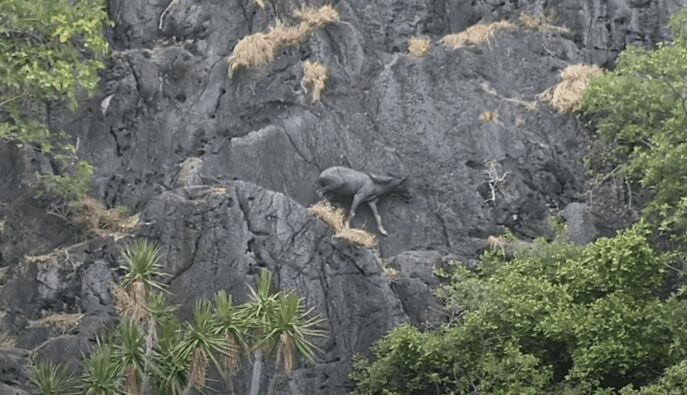Thai park officials spot rare, endangered serow

Wild animal enthusiasts will be delighted to hear that Thai National Park officials spotted a rare, endangered serow in the past week. Officials at Khao Sam Roi Yot National Park, located in Prachuap Khiri Khan province, spotted a serow on April 11, Hua Hin Today reported yesterday.
Video footage from Thai media shows the majestic creature carefully and gracefully climbing the very steep, jagged edges of a mountain, and feasting on leaves from trees.
Serows are large, goat-like animals with curved horns. They are known for being elusive, and very tricky to spot in the wild. This makes the sighting even more exciting.
Pongsathorn Promkhuntod, the head of the park, said the serow was likely a male due to its large size and white fur around the neck and body, which indicated that it is a mature adult.
Serows are native to Southeast Asia and found in countries including Thailand, Laos, Vietnam, and Cambodia. They can climb cliffs and rugged terrain, helping them to live in mountainous areas.
Unfortunately, wild serows are threatened by several forces, including habitat loss, hunting, and poaching. In Thailand, the species is listed as endangered, with populations declining rapidly in recent years.
The serow is a reserved wild animal and one of the 15 species listed in the Wildlife Reserve and Protection Act of 1992. The species is also listed as a category 1 animal in the Convention on International Trade in Endangered Species of Wild Fauna and Flora (CITES) agreement.
Khao Sam Roi Yot National Park is one spot in Thailand where the species can still be found, surviving in the park’s rugged mountains and cliffs. Pongsathorn noted that the park is a habitat for many serows due to the complex and high limestone mountain terrain suitable for the serow’s habitat. The park has strict measures in place, such as continuous patrols, to prevent the hunting of all kinds of wild animals, especially serows.
The park was awarded the Green National Park Shield Award in February this year, due to its efforts to protect the region’s natural beauty and biodiversity, while also promoting sustainable tourism practices.
Latest Thailand News
Follow The Thaiger on Google News:


























